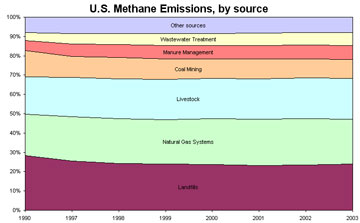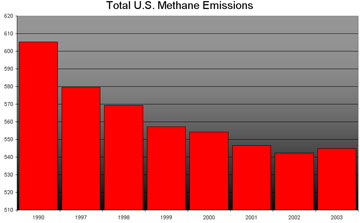Methane emissions rising, could worsen global warming
Methane emissions rising, could worsen global warming
mongabay.com
September 27, 2006
Concentrations of methane, a greenhouse gas more than twenty times more potent than carbon dioxide, are rising in Earth’s atmosphere finds a new study published in Nature.
After declining in the 1990s due to the industrial collapse of the Soviet Union, and the combination of more efficient use of natural gas and efforts to reduce landfill methane emissions in the West, emissions have risen since 1999 due possibly, in part, to the booming Chinese economy.
Globally, about two-thirds of methane emissions comes from human sources including production of oil and natural gas, mining, sewage and decomposition of garbage, changes in land use and deforestation, and livestock. About one-third of methane emissions come from oceans, wetlands, and wildfires. Most methane emissions never reach the atmosphere — they are broken down by ultraviolet radiation.
While sources of methane from human activities have increased since the close of the 1990s, the effect on the atmosphere has been mitigated by a reduction in wetland emissions of methane over the same period, according to the researchers who used computer simulations to trace the sources of atmospheric methane emissions based on 20 years of atmospheric measurements.
“Had it not been for this reduction in methane emissions from wetlands, atmospheric levels of methane would most likely have continued rising,” said Dr Paul Steele, from a scientist from Australia’s CSIRO Marine and Atmospheric Research and one of the paper’s authors. “This suggests that, if the drying trend is reversed and emissions from wetlands return to normal, atmospheric methane levels may increase again, worsening the problem of climate change.”
Not touched upon by the latest study but still of concern to some climate scientists are the stability of large frozen deposits of methane hydrates found at the bottom of the ocean and in terrestrial permafrost. The melting of these deposits, which are only stable only under low temperature and relatively high pressure, could trigger a massive release of methane into the atmosphere, worsening global warming. Some scientists believe past melting of methane hydrates may have been partly responsible for episodes of rapid climate change in the past.
ARTICLE SUMMARY FROM NATURE.COM:
Changes in atmospheric methane levels over the past twenty years are well documented, but the causes of these changes remain uncertain. Bousquet et al. use inverse (top-down) modelling to quantify variations in methane emissions from different sources between 1983 and 2004. They find that a decrease in the growth rate of atmospheric methane during the 1990s was caused by a decrease in anthropogenic emissions, but that anthropogenic emissions have increased again since 1999. To date, this trend has been masked by a coincident decrease in wetland emissions, but it is possible that it will cause total methane levels to rise again in the near future.
This article used information and quotes from CSIRO Australia, National Geographic Online, and Nature.com.









